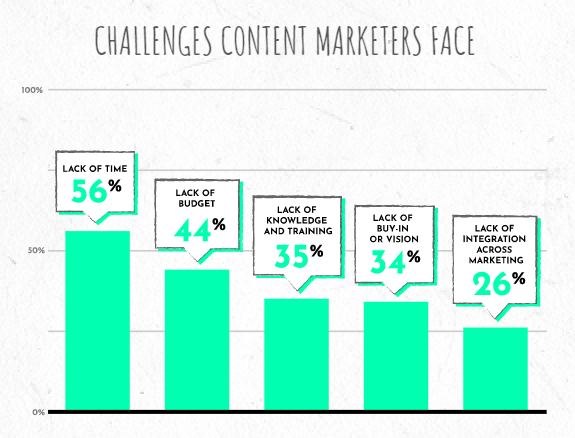The 5 biggest content marketing problems you face and how to solve them

Posted by Bryan Arnott
November 12th, 2019
Any content marketer out there who says he or she doesn’t face any problems with their team or strategy is lying, probably.
OK – so we can’t say for sure that it’s not all peachy keen for a select few content marketers. But in general, the data from our Irish Content Marketing: In Search of Strategy report shows that it isn’t always kittens and rainbows (although we wouldn’t mind the kittens) for the people who are regularly creating and promoting content.
See the top challenges content marketers face for yourself:
 Everyone runs into marketing problems at some point in their journey, so you’re not alone if any of the above struck a chord. But that doesn’t mean you have to give in and just accept defeat; instead, take the challenge by the horns.
Everyone runs into marketing problems at some point in their journey, so you’re not alone if any of the above struck a chord. But that doesn’t mean you have to give in and just accept defeat; instead, take the challenge by the horns.
Content marketing problem: Lack of time
If you’ve ever typed out edits to an eBook on one screen while posting a new Tweet with another, then you know exactly what we’re talking about here. There are only so many hours in the day and it always seems like the extra ones you need are just out of reach, like the last clean mug at the top of the cupboard.
But lack of time is a challenge that can extend beyond your own control and into content governance. Take B2B content marketers for instance, who have to wait an average of two months to launch an eBook, according to our own report. It doesn’t matter how quickly something can be produced – what’s more important is how long it takes to get signed off.
Solution: There isn’t a one-size-fits-all solution to overcoming time poverty as a content marketer, but better content governance can cover up a lot of shortcomings elsewhere in a strategy. Content governance in its simplest form is just a set of pre-defined responsibilities and rules that dictate who creates the asset, who approves it, who posts it in the right channels and who promotes it.
Even though you’d think those are pretty basic elements of a strategy every content marketer would know, you’d be surprised how many decisions are left in the air. When that happens, things start to look a lot like this:
 Ownership is a very important element in content governance. By assigning ownership over individual parts of the process, the entire strategy can operate like a well-oiled machine.
Ownership is a very important element in content governance. By assigning ownership over individual parts of the process, the entire strategy can operate like a well-oiled machine.
Content marketing problem: Lack of budget
We all have big plans, but do most companies have the budget to bring them to life?

The reality is that nearly half of all Irish content marketers face budgetary restrictions, which limits the capabilities of both content creation and promotion. It’s an issue that hits smaller teams the hardest, where staff are more likely to handle multiple tasks – some they’re not even familiar with – at once because the business can’t bring in an agency to help.
We all have to work within the restrictions of our budget, so how do we overcome the lack of it?
Solution: This bit of advice is a two-parter: repurpose your content and track your results.
Seems simple, right?
Let’s break it down a bit further. Far too often we’ll see companies create an amazing asset – say, an eBook – that lives in one campaign on the website for the rest of eternity. Your team went through hours of effort to create that content, so you should be getting at least a ten-fold return on it.
Many assets can be repurposed. An eBook can be the basis for five or 10 blogs, a couple of videos, a few infographics and even an email campaign; all by simply breaking it down and reusing the content elsewhere. Before taking the time to create something from scratch, consider what you already have laying around collecting dust and see if you can put some polish on it.
Secondly, by tracking the performance of your campaigns – something that’s easily done with a documented content marketing strategy – you can prove the value of content marketing to the company. It’s simple maths: present the ROI and watch as they give you a larger purse to generate more leads.
Content marketing problem: Lack of knowledge and training
Albert Einstein once said, “A true genius admits that he or she knows nothing.”
Humility is a virtue in content marketing; the trends and advantages are constantly changing. Because of that, it can seem a little overwhelming to be a content marketer. It feels like there’s always someone out there who knows more than you do.
Training on the job isn’t always the easiest either. Say you’re on a small team that has to deliver quick results? You might not have the time or leeway to go to classes or take chances on your campaigns.
Furthermore, with so many new strategies becoming available year-by-year, a lack of knowledge and training can leave your business behind from a performance standpoint. Staying up to date with the trends is the equivalent to making sure the company’s marketing strategy is modern.
Solution: Don’t forget to invest in yourself. The content marketing community is a welcoming community; there’s a seemingly never-ending list of blogs and news websites, classes and conferences, certifications (some of them free!) and training courses.
Take chances as much as possible, whether they be as small as A/B testing your email subject headers or changing up the meta descriptions and page titles to try and improve your page rankings. Every learning experience doesn’t have to be an award-winning project or end up in flames – there’s a middle ground that every content marketer should find.
Lastly, consider working with a content marketing agency or consultant to help fill the gaps that you know your team has. If you have social media specialists that can crush content amplification, but you don’t have any subject matter experts or great writers in-house to create that content, working with an agency that has a proven track record of success in content creation can make the difference.
Content marketing problem: Lack of buy-in or vision
There’s a good chance that no one in your company looks at content marketing the way you do.

We agree; it’s pretty beautiful. But when your boss or a decision-maker doesn’t share the same opinion, projects and other ROI-worthy ventures can get left out to dry.
Let’s not overlook the fact that marketing teams across the world are achieving more and becoming more efficient because of technology. Those solutions don’t come cheap – and sometimes not even free – despite the fact that they can speed up the time it takes campaigns to reach maturity and integrate previously siloed functions.
Solution: The two problems aren’t mutually exclusive – a lack of vision commonly stems from a lack of buy-in – but solving one can help the other. Generating strong support for content marketing throughout the organisation can be as simple as proving its worth (AKA, giving people a reason to buy-in).
Measuring the ROI of content marketing is a sure-fire bet to prove how much revenue it can contribute (if everything is working as expected). Yet, just 49 percent of Irish content marketers measure ROI, according to our report.
That leaves a massive 51 percent who either don’t or – maybe worse – are unsure if they do. Figure out how your campaigns contribute to keeping the business profitable and there’s a good chance that you’ll be able to secure larger investments to scale your work even more.
Content marketing problem: Lack of integration across marketing
Content marketing used to be as simple as creating blogs and sharing them on social media. Now, there are dozens of tools that could play a role in any part of the process, from asset creation to amplification and paid social promotion.
The modern content marketer is expected to be a multi-faceted unicorn and Inspector Gadget hybrid, able to launch multiple campaigns seamlessly while tracking their performance and making alterations on the fly.

Solution: Take a long step back from your day-to-day marketing activities and define what actions your team does most often during the week. Then, create an ecosystem that aligns those tasks with digital tools that can make them easier to carry out. Lastly, put that ecosystem under the umbrella of a powerful marketing automation platform, like HubSpot or Marketo – whichever suits your company’s unique needs.
Taking part in this exercise will allow you to align digital solutions that integrate or work seamlessly with each other, as opposed to adding products as needs arise. That only creates a more chaotic work environment with tens of tools in the mix and leaves out the potential to automate certain instances via integration.
None of us knows everything about content marketing (that’s why you’re here, right?) but that doesn’t mean you can’t find out how your peers approach it. Read our latest report by clicking the button below to find out how your peers are doing when it comes to Irish content marketing.

Bryan Arnott

Previous Post
Where did you get the name? How to name a Content Marketing Agency
Next Post

256 are finalists at the 2019 Spiders Awards
Subscribe Here
You may also like...
Nadia Reckmann | Nov 23, 2023
Unveiling the top 5 game-changing digital developments of ...
Mary Riordan | Jul 5, 2023
Kevin Browne | May 2, 2023





